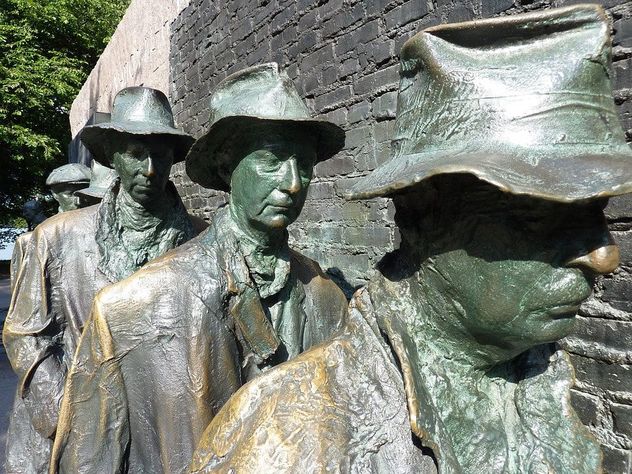|
TUMBLING
by Geoff Garwick I. The Abs. A breath—that’s short—bikini brief short. Chest rises. Chest Falls. Then our scene ends. It’s curtains for you. A meteor is slower When compared to a star’s orbit, Than human life’s flickering trends. Air twisting gymnast soars wingless, Dwarfed by the towering high bar. Floating weightless in the giant’s Apogee for shards of a second, Where the flyer lives lighter than a star. Leaves float for hours, days, years, Compared to the human pause atop. Brains and muscles flip us higher, Brave, amazing aerial displays But in wink’s time, we--still—must drop. II. The Skin and Drippy Nose. In my chameleon-weathered homeland We are amazingly well-seasoned: Oregano, ginger, chipotle and cumin Have nothing on us at all. But merely calling the plunge “autumn” Won’t dull the pain when we hit bottom. III. The Scapulae and Wishbone. Watch that well-greased first step, You who, soon a little lower than angels Formerly looking up to you, Now clutch wings requiring glue. You’ll miss the feathers most, No longer a morning person, Meteoring for uprushing Ground, where, unfledged, you’ll be crushing De-aeried favorite son, Epaulets and pinions gone, Blaze snuffed by exile’s pall For long, lonely years you’ll fall. Heaven’s best becomes its dreck When the plucked throne hits the deck, Now mortals must clean up the wreck Of dull wings driven through your neck. IV. The Rib and Teeth Reptile. Defile. Beguile. No-no fruit: Bitten cute. Sharing loot. PLUNGE FROM GRACE. LOST OUR PLACE: SWORD IN FACE. The Eve of nude. Sweat dropping, crude. Birth pangs turn rude. V. The Pelvis and the Femur How many light bulbs does it take To help a crucial bone to break? I hear it requires only one If a ladder guarantees the fun. If you’re not yet drooled or mumbling Begin the collapse by stumbling. In a fall from gravity’s grace, Smash at least one joint, then replace. The down escalator’s rumbling As you slouch toward further crumbling. When legs slither after bones are burst The crowd assumes your mental worst. Abcess-minded bits of bumbling Unleash mosquito stings of humbling, In the mornings the geezer crawls Until its damned London Bridge falls. VI. The Midbrain and the Heart Yearning and yearning, quasar-lashed, Paired stars gyre about a new Fulcrumed, formerly empty, point. A jet of fusing synergy Sweeps from the rotating partners. Their center does not fold-- Not origami; tempered edge. What chimera'ed beast measures self By dear circumnavigations Of the incoiled, twined other? WE, screaming “now”, dive into love, Seals lost, beaks gaped, talons flared, Tearing hungrily into our Own deepest viscera to feed Ravening chicks of hopeful melds. Sloughing off lost Jerusalems, The universe drops pulled-out strings, Which dared to exist outside of we -- Extruding what’s not Gemini, The sad fey shadows beyond us. VII. The Wrist and Phalanges Dice play at Being divine. Randomly crying. Through infinite games. © Copyright Geoffrey Byron Garwick. All Rights Reserved.
0 Comments
"WAITING for GODOT, or SOMEBODY LIKE HIM..." a new essay, 2nd in a series by Geoff Garwick.4/9/2018 MORE WHITTLING AWAY on “The MUDDLED MIDDLERS”, AMERICA’S EMBATTLED & IMPERILED MIDDLE CLASS... By Dr. Geoffrey B. Garwick In the first of my three-part series on the dwindling and deprivileging of the USA’s middle class ( see The Diction Aerie’s Guest Forum, March 4, 2016 post ) I reviewed a few of the less-publicized indicators of this financial topsoil loss, an erosion that is producing a mammoth and engulfing Dead Zone in our national sense of community. In this essay I turn not to some shadowy figure of hope who never appears -- as in Samuel Beckett’s play, “Waiting for Godot” -- but to the ubiquitous phone menus we routinely wrestle with when calling nearly any business nowadays. Examining such supposedly beneficial time-saving systems, we are witnessing more of the thousand cruel cuts taken from the non-rich, whether they’re ensnared and likely forever lower class, or destined to be future lower class. Or even the would-be middle class citizens. Albert Einstein in his relativity articles posited the amazing interchangeability of energy and matter. His equations also rested on the intimate intertwining of space and time. That same spirit of transformation holds when tycoons, balked by any strenuous or rote-work activity, complain that “time is money”. They mean, of course, that said tycoon – who like an Orwellian Animal Farm elite is “more equal than others” -- stands to earn so much money per precious minute that every stray second must be seized to harvest even more billowing income. This striving for time efficiency almost never seems to extend to the tycoon’s underlings, such as secretaries and servants, whose sole sad raison d’etre is to waste as many of their minutes puttering about to meet every whim demanded by said tycoon. A few examples are shared below of procedures and circumstances which waste the previous time of the unrich, particularly the middle class or those aspiring to fight their way toward becoming bona fide Middlers. * THOSE @#$% VOICEMAIL MENUS: Phone menus are valuable for companies insofar as they replace or substantially minimize the need for receptionists or inquiry responders. However, it should be remembered that these eliminated phone jobs, if covered by people in the USA (not Mumbai or Manila) who are properly trained and empowered so they could be of maximum help, would go a long way to boosting the domestic inventory of America’s desperately needed lower-middle-class jobs. Now, getting down to the nitty gritty -- do the phone menus actually assist any folks who are calling? It is unclear if their often incomplete or overlapping categories ever help most customers, but they can be especially vexing, even infuriating, for first time users. Just sitting through a long-winded robo-recitation of all the categories which do not fit a novice’s needs can be time-consuming. But most galling are the times when what is required is a human being with flexibility and encouragement, virtues by which people possess key advantages over machines. Among the critical signals that a menu is designed as a token, not an aid, to customers are those damnable lists which never offer you some version of a “speak to a representative” option, or which by demonic frequency only offer a non-functioning or utterly incorrect phone number. Who among us does not have to wrestle with phone menus? Answer – only those wealthy enough to hire minimum wage go-fers to call and wait on the line for them, or families in which someone stays at home all day. Who is most stressed by being dependent on such menus?: those struggling to reach or stay in the middle class, possibly working two or three adult jobs per family. They are often sleep-deprived, quality-time impoverished, and starved for recreation. For folks already time-poor, the two, three, four, or more minutes wasted on listening to idiotic useless categories can be unbearably painful ancillary indignities to the core frustration of never finding the info they hoped for in the first place. * DAY CARE: There are basically two situations in which American families are able to afford day care: if it’s subsidized by an employer or the government, or if the family is already affluent. This means that some parents use relatives or non-working (and generous) friends or the two parents work different shifts to mitigate the need for day care. It is a given that unless you can afford to hire nannies, sleep and many other healthful activities are already endangered by raising children and having full-time jobs. The working poor cannot finance daycare on their own and may lose daycare subsidies when they start to earn an income above the starvation level. Until the price of daycare is subsidized at higher levels so that it does not eviscerate a poor family’s budget, child-raising for the middle or working class family often means that there is one less wage earner. * HUMANLESS BILLING SYSTEMS: Recalling that a critical element of many financial communications is to make the use of “expensive" customer contacts with humans; bills whether online or paper often are designed to hide or dodge convenient access to those mythical creatures called “representatives”. As with phone menus, favorite techniques of human-avoiding bills include telling customers not to attach comments to payments, hiding contact information in small print on obscure back pages, or simply not supplying any phone numbers for customer assistance on the bills. Thus, the double whammy for both remnant or aspirant Middlers is first, the time-devouring irritant of problem resolution delayed and second, the tragic elimination of middle-class jobs. * ONLINE “DYSCONVENIENCES”: Sure, if there is some activity you do repeatedly, the computerization of it can be convenient. But consider also the huge and continuing increase in required use of the online mode for many activities with which you may not interact often enough to ever become familiar. Such shifts in responsibility can be a great money saver for our towering tycoons, comfortably insulated from middle class stressors, but the bottom line is this: the middle class consumer today is expected to do a hefty amount of labor and take an ever-increasing responsibility for arrangements formerly done by workers in all sorts of companies, notably larger businesses. Big Biz is pawning off vast chunks of its labor costs back on the Middlers, whom they allegedly formed their companies to serve in the first place. Some of this shift in workload had been taken by relying on offshore workers, but perhaps now even that expenditure is resented. Meanwhile the rich can hire people to respond to this new time-burden, Muddled Middlers without personal assistants or their own bureaucracy simply cannot do it. * EVER-CHANGING TIMES: With fewer well-paying jobs, it will increasingly be people in the later stages of their lives and careers who earn comfortable, middle class incomes. For such late-bloomers, instead of decades of middleness, it may be only the last ten years of their working days that they get to be real Middlers. If societal and technological change continues to accelerate, the reliance on humanless systems may well become even more onerous for the surviving Middlers, even if they are aging Millennials or other generations who were suckled on cyber-tech, and the Conquering Cloud. In such a future’s Bereaved New World -- of constantly accelerating Mutatis Mutandis -- those lower and mid-Middlers who once ran the complex tech systems will eventually drop out or retire, usually with seriously strained financial resources. As new wrinkles enter the current tech systems, these once-in-the-know folks, as their knowledge over-ripens, may discover newer more vexing stresses – far worse than wading through a tortuously useless phone menu. These hapless aging Middlers to come will learn the future version of our present anguish – precious time lost while desperately hoping to speak to a real person whose annunciatory recording claims that “your call is very important to us.” (Yeah right.) All this from a company who finds us mere plebian Middlers apparently not important enough to hire enough (or pay well enough) to attract more expert question-fielders to answer our sincere calls politely and expeditiously. * WAITING IN TRAFFIC: This maddening time waster often has been explored, since it is such a glaring example of the lifestyle limitations and costs of being lower middle class. Having toll roads or pay-for-use highway lanes may exclude the middle class or at least painfully pinch their budgets, but is merely one more trivial expense which the rich will readily absorb. Lower middle classers, whose incomes have basically have been flattened for decades must add to their formidable pile of bills if they want to save some of the time of commuting with the help of these special lanes or roads. One of the benefits of mass transit, another alternative to sitting in traffic, is that it may allow time for reading, contemplation, or relaxation during the bus or train trip. However, most representatives of the rich do not want to pay for this “free” time for some Middlers or aspiring Middlers. And when the Holy Grail of traffic control finally arrives (if Elon Musk is right) within the next decade or so – the driverless robo car – of course only the rich will be able to afford it. Because in the Techno-Econo Animal Farm of post-modern America, “All drivers are equal, but some are more equal than others.” * * * * * * * * * * * * Back in the late 1960s, the British Invasion rock group, the Kinks, sang what could have been a prophetic dirge for today’s lower and mid-middle classes about being “…so tired, tired of waiting…”. There weren’t even phone menus back then and a lot fewer “pay way” lanes, but the Kinks’ sentiments nevertheless resonate through the middles waiting for help on the phone, for rises in real wages, for egalitarian transportation (maybe another day we can lament the airlines’ relentless attacks onlower and middle class flyers),for affordable education, or for human-backed billing systems. If we wait and wait (and wait) long enough, will Godot or somebody like him, or at least middling respect, ever arrive? Don’t hold your breath America. You might end up turning blue, minus the red and white stripes -- across your back. © Copyright Dr. Geoffrey B. Garwick. All Rights Reserved. ______________________________________ Editor's note: Our indelibly progressive amigo de letras, Geoff Garwick, will continue raging against The Machine in a future post, coming soon to a website near you. Stay tuned. Or at least reasonably open-minded. But never look backwards. Sump'm might be gainin' on you. ______________________________________ (Special thanks to photographer Jim McIntosh of Philadelphia for his top photo of Bread Line Statues. And warm thanks to Ryan McGuire, Ithaca NY for his evocative monochrome of Waiting Woman, below. Another hearty 'n hale high five to the gifted team at Pixabay for their stellar cornucopia of art pics.) |
The GUEST FORUM
Gems from
Our Dear Friends. Archives: |
All text & photo content of this website is
© Copyright 2015-2024, John Hessburg
& The DICTION AERIE.™ All rights reserved.
All short stories, essays, plays, poems, lyrics,
anecdotes, humor pieces, texts & blog titles
are copyrighted by the by-lined authors.
All website text titles & button headlines are
trademarked by The DICTION AERIE ™ --
owned by John Hessburg & USDT Network.
Note: no reprints of any kind are permitted --
per federal copyright law -- except by the
expressed written consent of by-lined authors.




 RSS Feed
RSS Feed